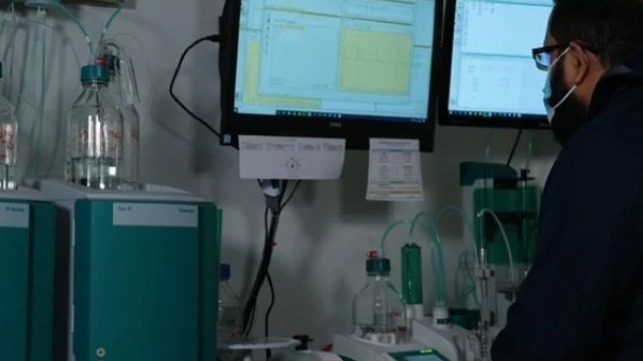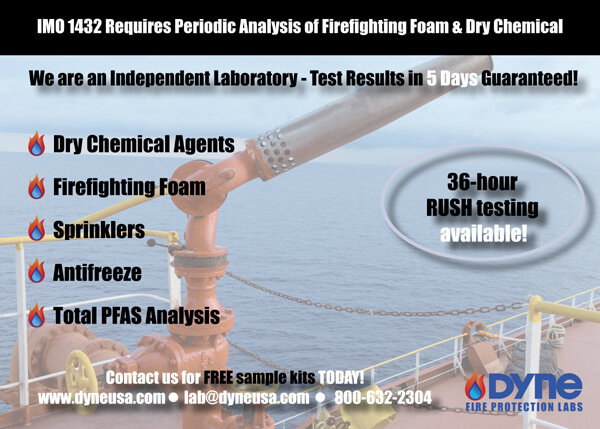Laboratory Testing to Help Maintain Fire Protection Systems

The International Maritime Organization (IMO) MSC.1/Circ. 1432 Revised Guidelines for the Maintenance and Inspection of Fire Protection Systems and Appliances requires the testing of various fire protection equipment and chemicals periodically, some of which requires the use of a laboratory.
Foam Concentrate Testing
With the exception of alcohol resistant (AR) protein-based foam concentrates, three years after installation and annually thereafter, samples of foam concentrates are to be taken and subjected to the tests in MSC.1/Circ. 1312 Revised Guidelines for the Performance and Testing Criteria, and Surveys of Foam Concentrates for Fixed Fire-Extinguishing Systems or MSC/Circ. 670 Guidelines for the Performance and Testing Criteria and Surveys of High-Expansion Foam Concentrates for Fixed Fire Extinguishing Systems depending on the type of foam. AR protein-based foam concentrates are to be tested annually regardless of the installation date.
IMO 1312 and 670 both require the following tests be conducted periodically on foam concentrates:
• Sedimentation
• pH value
• Expansion Ratio
• Drainage time
• Volumic mass
• Small scale fire test*
• Chemical stability test*
*Only required for protein-based alcohol-resistant foam concentrates
The results of the periodic testing should be within an acceptable range of the approval results. The collection of excess sediment (>0.25% by volume) can affect the foams ability to flow through equipment as designed. A pH trending outside of the required 6-9.5 range, which could be due to the normal or accelerated degradation of the foam product due to storage conditions and/or contamination, can be considered corrosive which could impact equipment integrity, and cause foam degradation. Expansion and drainage time, typically referred to as a measure of foam quality, are important performance metrics to ensure the foam provides the required extinguishment performance over the years. The volumic mass, or density, is a good indicator of contamination including, but not limited to, dilution. The additional tests required for alcohol resistant protein-based foams are to ensure the product remains alcohol resistant – that is, that it continues to provide a foam blanket that is not readily miscible with polar solvents.
Dry Chemical Powder Testing
Every two years, the dry chemical powder in a fixed dry chemical powder system must be tested for moisture content.
ISO 7202 Fire protection – Fire extinguishing media – Powder and EN 615 Fire protection – Fire extinguishing media – Specifications for powders (other than class D powders) both agree moisture content shall not exceed 0.25% by mass. Moisture can lead to caking of the powder, which could affect its ability to flow through equipment as designed, as well as corrosion, which can lead to the dangerous weakening of pressured vessels.
Dyne Fire Protection Labs
Due to the equipment and expertise required to complete the foam and dry chemical powder testing, a laboratory is typically required. Dyne Fire Protection Labs is here to help.
Dyne is accepted by the United States Coast Guard (USCG) as an independent laboratory in accordance with 46 CFR 159.010 and in connection with approval series 162.033, Foam Type Fire Extinguishing Systems. Specifically, Dyne is authorized to perform the periodic analysis of foam concentrate samples as required by the applicable inspection subchapters in Title 46 of the Code of Federal Regulations, and as recommended by IMO 1312.
Dyne Fire Protection Labs is an independent testing laboratory serving customers throughout the world. Dyne offers quick, easy, and accurate testing with great customer service. Dyne Fire Protection Labs has been testing foam for over 20 years and has since expanded their services to include the testing of dry chemical powder, antifreeze solutions, and fire sprinklers to help system owners and/or their designated representatives fulfill various inspection, testing, and maintenance (ITM) requirements that require a laboratory. Dyne capabilities go beyond the required testing. For example, Dyne not only can determine the moisture content in dry chemical powder, but also the amount of “active ingredients” in the product such as, but not limited to, monoammonium phosphate, sodium bicarbonate, and potassium sulfate for those looking to ensure the product in the system is sufficient for the hazard. Dyne can also determine the amount of total organic fluorine (TOF), which is directly related to the amount of per- and polyfluoroalkyl substances (PFAS), in both foam and foam system water for those customers concerned with growing PFAS scrutiny and regulations.
Dyne sends test reports via electronic mail in 5 business days or less with rush testing (1-2 business days) also available. Dyne also offers sampling kits for foam and dry chemical powder free of charge and, for those customers in the contiguous United States, with free shipping.
View Dyne’s short Firefighting Foam and Dry Chemical promo videos for more information or visit the company online.
This article is sponsored by Dyne Fire Protection Labs.
The opinions expressed herein are the author's and not necessarily those of The Maritime Executive.


